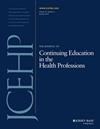Addressing the Mental Health Needs of Inmates Through Education for Correctional Officers-A Narrative Review.
IF 1.6
4区 教育学
Q2 EDUCATION, SCIENTIFIC DISCIPLINES
Journal of Continuing Education in the Health Professions
Pub Date : 2023-10-01
Epub Date: 2023-03-16
DOI:10.1097/CEH.0000000000000484
引用次数: 1
Abstract
Supplemental Digital Content is Available in the Text. Introduction: People with mental illness are overrepresented in correctional facilities. Correctional officers (COs) lack education to respond to inmates with mental illness. A review was conducted of mental health education programs for COs to identify factors related to effectiveness. Methods: Medical and criminal justice databases were searched for articles describing mental health education for COs. Studies including measurable outcomes were analyzed using an inductive analytic approach. The review adhered to Preferred Reporting Items for Systematic Reviews and Meta-Analyses guidelines for scoping reviews. Data were synthesized using Moore seven levels of outcomes for continuing professional development education. Findings were grouped by curriculum content and described according to levels of outcome. Results: Of 1492 articles, 11 were included in the analysis. Six described mental health programs, two described skill-specific programs, and three described suicide prevention programs. Programs reviewed content about mental illness, practical skills, included didactic and experiential teaching. The programs achieved level 5 on Moore taxonomy. Programs led to improvements in knowledge, skills, and attitudes among officers; however, improvements declined post-training. Officers were receptive to facilitators with correctional or lived mental health experience. Experiential teaching was preferred. Common themes related to programs' effectiveness included applicability to COs, information retention, program facilitators, and teaching methods. Discussion: There is limited, but positive literature suggesting that education programs are beneficial. The decline in improvements suggests need to ensure sustainability of improvements. This review can guide the planning of future education programs for COs based on continuing professional development best practices.通过对惩教人员的教育来解决囚犯的心理健康需求——一篇叙述性的综述。
精神疾病患者在监狱中的比例过高。惩教人员缺乏教育,无法应对患有精神疾病的囚犯。摘要本研究以心理健康教育项目为研究对象,探讨与心理健康教育效果相关的因素。方法:检索医学和刑事司法数据库中描述COs心理健康教育的文章。包括可测量结果的研究使用归纳分析方法进行分析。该评价遵循系统评价和荟萃分析的首选报告项目指南进行范围评价。数据综合使用摩尔七级结果继续专业发展教育。调查结果按课程内容分组,并根据结果水平进行描述。结果:1492篇文献中,11篇纳入分析。6个描述了心理健康项目,2个描述了特定技能项目,3个描述了自杀预防项目。项目回顾了有关精神疾病、实用技能的内容,包括说教式和体验式教学。这些程序在摩尔分类法上达到了5级。项目提高了官员的知识、技能和态度;然而,训练后的改善有所下降。警官们愿意接受有矫正或精神健康生活经验的辅导员。体验式教学优先。与项目有效性相关的常见主题包括对项目主管的适用性、信息保留、项目促进因素和教学方法。讨论:有有限但积极的文献表明教育项目是有益的。改进的减少表明需要确保改进的可持续性。这一综述可以指导基于持续专业发展最佳实践的未来COs教育项目的规划。
本文章由计算机程序翻译,如有差异,请以英文原文为准。
求助全文
约1分钟内获得全文
求助全文
来源期刊
CiteScore
3.00
自引率
16.70%
发文量
85
审稿时长
>12 weeks
期刊介绍:
The Journal of Continuing Education is a quarterly journal publishing articles relevant to theory, practice, and policy development for continuing education in the health sciences. The journal presents original research and essays on subjects involving the lifelong learning of professionals, with a focus on continuous quality improvement, competency assessment, and knowledge translation. It provides thoughtful advice to those who develop, conduct, and evaluate continuing education programs.

 求助内容:
求助内容: 应助结果提醒方式:
应助结果提醒方式:


